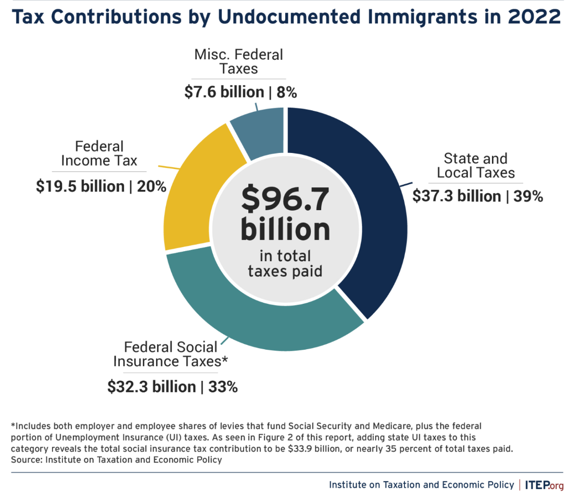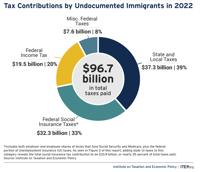
(Canva art by Amairani Hernandez.)
While the International Revenue Services (IRS) and Immigration Customs Enforcement (ICE) were making a deal, allowing ICE to request information from the IRS about individuals who have been ordered to leave the United States or are under criminal investigation, many were surprised to find out that undocumented immigrants contribute to the economy.
CALÓ News did the research so you don't have to. Here's the breakdown.
According to the California Budget and Policy study, in California, undocumented immigrants contributed $8.5 billion in state and local taxes in 2022. And the number would only increase to at least $10.3 billion if undocumented taxpayers were granted work permits. These individuals are immigrants who pay taxes every year with a nine-digit code known as an Individual Taxpayer Identification Number (ITIN).
For many years the IRS has consistently assured undocumented taxpayers that their information is confidential and that it would be safe for them to file tax returns, but now with this new agreement in place, many may be hurt by the policy change, including the economy.
Undocumented immigrants as a whole paid an overall total of $96.7 billion in federal, state, and local taxes in 2022, which means undocumented immigrants paid an average of $8,889 per person that year. In other words, for every one million undocumented immigrants who reside in the country, public services receive $8.9 billion in additional tax revenue.

(Chart created by the Institute on Taxation and Economic Policy.)
Undocumented immigrants support the economy by paying various taxes, including sales and excise taxes on everyday goods and services like utilities, household items and gasoline, along with property taxes. They also contribute through income and payroll taxes, which are deducted from their paychecks or paid by filing tax returns using their ITINs.
According to another study by the Institute on Taxation and Economic Policy (ITEP), more than a third of the tax dollars paid by undocumented immigrants go toward payroll taxes and funding programs that they do not qualify for. Undocumented immigrants paid $25.7 billion in Social Security taxes, $6.4 billion in Medicare taxes, and $1.8 billion in unemployment insurance taxes in 2022.
In 2023, despite the reversal of the 2019 Public Charge rule, about 12% of adults in immigrant families avoided programs like Medicaid, the Supplemental Nutrition Assistance Program (SNAP) and housing assistance—fearing it could jeopardize their green card applications, while others avoided the programs due to immigration concerns.
Recent research from the UCLA Latino Policy and Politics Institute also demonstrates that undocumented immigrants contribute more to the U.S. healthcare system than they use. In 2017, immigrants generated a net surplus of $63.2 billion in payments to Medicare, Medicaid and private insurers.
Additionally, according to the ITEP study, income tax payments by undocumented immigrants are affected by laws that require them to pay more than situated U.S. citizens. For example, they are barred from receiving meaningful federal tax credits like the Child Tax Credit or Earned Income Tax Credit. Sometimes they do not claim refunds they are owed due to lack of awareness and concern about their immigration status.













(0) comments
Welcome to the discussion.
Log In
Keep it Clean. Please avoid obscene, vulgar, lewd, racist or sexually-oriented language.
PLEASE TURN OFF YOUR CAPS LOCK.
Don't Threaten. Threats of harming another person will not be tolerated.
Be Truthful. Don't knowingly lie about anyone or anything.
Be Nice. No racism, sexism or any sort of -ism that is degrading to another person.
Be Proactive. Use the 'Report' link on each comment to let us know of abusive posts.
Share with Us. We'd love to hear eyewitness accounts, the history behind an article.